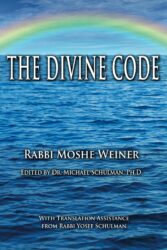
ב''ה
 Subscribe to our
Subscribe to ourGentiles should first and foremost understand and follow their Seven Noahide Commandments that G-d requires of them, for which the reward granted to the Torah-faithful pious Noahides is a place in the future eternal World to Come. With this commitment, a Gentile should start learning and keeping the Seven Noahide Commandments in the proper way, as they are explained within the Torah Law received by Moses from G-d at Mount Sinai.
Under the guidance of an Orthodox Rabbi or mentor, this can certainly include the study of Chassidic discourses and teachings that are relevant to the Noahide Code. A good additional observance to begin following is to give properly directed charity, and to give often. This can be even daily, and even if it is only a small amount that is dropped into a charity can or box in one’s home.
The book “The Divine Code” gives the following instructions on this subject (Part I, Chapter 3), which are presented here. The parts in square brackets [ ] are insertions for additional clarification:

6. If a Gentile wants to do one of the other commandments from the Torah [beyond the 7 Noahide Commandments] in order to receive a practical benefit [for himself or for society] (but not as a direct commandment), [he should not be prevented] from doing so, even according to its correct laws for Jews (for example, if he desires to tithe for [proper] charity from his money or produce)… However, if a Gentile observes any of the Jewish commandments from the Torah as a religious obligation (even if he does so from a desire to receive a spiritual reward), this is forbidden based on the prohibition of adding a commandment, and there is no spiritual reward to be derived from this.
Although Gentiles are not to observe the restrictions or the distinctive rituals that are commanded to Jews for their Sabbath and religious festivals, there are a few of the Jewish festivals that have messages that are also applicable to Noahides, namely: Rosh HaShanah (the annual Day of Judgment for every person), Sukkot (the annual time of judgment for the rainfall that each nation will receive, which is also characterized by the themes of unity and joy), and Hanukkah (publicizing G-d’s saving miracles to the public at large). Please see the posts on this subject in our Q&A Forum, in the thread titled “Honoring the Festivals”: https://asknoah.org/forum/showthread.php?tid=35
7. Gentiles are especially forbidden to perform commandments that require the holiness of a Jew, such as writing a scroll of the Torah or a mezuzah or phylacteries (tefillin in Hebrew).
The general rule is that any Jewish mitzvah between man and man, or between man and G-d, which has a reason and a logical benefit for a person or society, is permitted for Gentiles to perform. But this does not apply for any commandment that does not have a logical, natural benefit, but is rather a sign for the Jews (e.g., wearing ritual fringes [tzitzit] or phylacteries, or affixing a mezuzah on a doorpost), or is a G-dly statute for the Jews without reason or benefit understood to a person [as to logically how and why the ritual would bring any natural benefit]. A Gentile should be prevented from performing such commandments and should be taught that it is improper for him to observe them.
It is not problematic that male Gentiles are allowed have themselves circumcised as a spiritual observance (although it is meant to be a sign in the flesh of a Jew), since many Gentiles are circumcised for medical purposes, and not to add a commandment or a new religion. Thus, a male Gentile who wishes to be circumcised in order to [also, or instead] refine his personality and his body and its desires may do so. But if he is not descended from Keturah [another name given to Hagar, the pilegesh wife of Abraham], he should not do so as a commandment [but Arabic men are obligated by Torah to do so as a commandment, since they are presumed to be descended from Keturah].
8. The above-mentioned rule applies only to Jewish commandments that are not duty-bound by logic (even if they have a logical reason) such as circumcision or tithes [see above]. However, those that are duty-bound by logic, such as honoring one’s parents, and kindness and charity, are obligated to be kept by Gentiles, at least in a general way, because such is the correct way for a person to act, as befitting the image of G-d in which he was created. However, a Gentile may not keep them because it is a commandment to him from G-d, but rather because one is obligated to be a good, moral person.
Many prohibitions that are commanded upon Jews are obligations for Gentiles to observe based on logic, such as the prohibitions against hating others, taking revenge or bearing a grudge. A Gentile should observe these prohibitions out of human decency, and not as Divine commandments of their own. This duty is an absolute obligation upon Gentiles, and they are liable to be punished for transgressing these obligations and for acting against moral and logical practices, as the Generation of the Flood was punished in the days of Noah.
9. Gentiles are obligated to give charity, and whether as an individual or a community, they are obligated to be concerned about help for the poor and needy, to help them appropriately in any way possible. Sodom and Gomorrah were destroyed only on account of their refusal to uphold and help the destitute, and their outlawing of any charity or help for the poor; for this, G-d judged them to deserve annihilation.

10. Gentiles are permitted to add any prohibitions in order to guard themselves against transgression, or to establish a correct and orderly society. This is desirous as a part of observing the obligations of the Noahide commandment to establish courts of law and develop proper societies in the world. Examples are societal restrictions against harassing women and children, and the punishments set for transgressing such laws. The prohibition of adding a religion or a commandment does not apply to this, because it is part of keeping the Noahide obligations of establishing courts and laws, and proper societies in the world.
This only applies to restrictions Gentiles accept upon each other as communities, to avoid damages. But it is prohibited to add communal restrictions as if they were those commanded by G-d (for example, if a Gentile community were to establish a law against eating meat from an unslaughtered animal carcass, as if it were a transgression [for Gentiles] like eating meat that was severed from a living mammal or bird), because this would be instituting a new religion.1
However, if an individual wishes to accept a restriction in order to gain a practical personal benefit or to refine his personality, then he is not establishing the restriction as if it were a prohibition for him that is commanded from G-d, and it is permitted. Otherwise, it is prohibited.
1 That is to say, [if] they wish to restrict the [Gentile] community in this additional manner as a religious precept. Similar to this would be a law against eating pork, which is permitted for Gentiles (and the same applies for an individual [Gentile], if he adds it for himself as a religious precept). However, if a person wishes to restrict himself from eating meat from an unslaughtered carcass for the purpose of guarding his health, or from eating any pork or shellfish or any other food if he is disgusted by it (or for medical benefits), this is permitted…